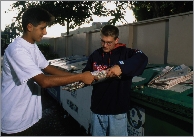1 TRY OUT LANGUAGE
2 LEARN GRAMMAR
3 APPLY ON YOUR OWN
Use Verbs in the Present, Past, and Future Tense
The tense, or time, of a verb shows when an action happens.

Action Time Line
• Present tense verbs tell about actions that happen now or often. The verb ends in -s only when it tells about one other person, one place, or one thing.
EXAMPLE The speaker donates his time to persuade people. • Past tense verbs tell about actions that already happened. Add -ed to most verbs to form the past tense. Or use the correct form of an irregular verb.
EXAMPLES The students found litter all over the ground.
They contacted the local hardware stores.• Future tense verbs tell about actions that have not yet happened. Use will before the main verb to form the future tense.
EXAMPLES The local store will donate giant trash bags.
The kids will thank you.
Practice Together
Say each sentence. Change the verb to the past tense and the future tense. Say both new sentences.
1. The playground is not safe.
2. Some swings need new seats.
3. We sort the litter into trash and recycled items.
Try It!
Say each sentence. Write the past tense and the future tense of each verb on a card. Then say both new sentences.
4. My dad fixes the fence.
5. I paint the fence white.
6. The city workers take away the trash.

Teens sort trash and recycled items.